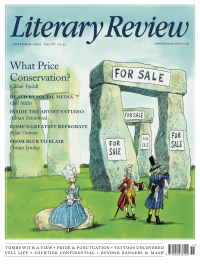Miranda Seymour
Testament of Friendship
Between Friends: Letters of Vera Brittain and Winifred Holtby
By Elaine and English Showalter (edd)
Virago 496pp £25
Elaine and English Showalter’s lively, perceptive and immaculately edited selection from the extensive correspondence between Vera Brittain and Winifred Holtby shows the ruthless degree to which Brittain relied upon the devoted support of a perhaps more brilliant younger woman, one who gladly appointed herself Brittain’s handmaid while pursuing a remarkable career of her own. In her Testament of Friendship (1940), Brittain suggested that the husbandless, childless Winifred, five years her junior, had been the chief beneficiary of their relationship. By then, Winifred was dead and therefore in no position to contradict her friend’s distorted account of their shared past.
Brittain and Holtby met at Somerville College, Oxford, in 1919 and decided – boldly for those times – to share a London flat while forging their literary careers (neither woman needed to earn a living). Viewed from the outside, they made an unlikely couple. Brittain, introverted, fiercely ambitious and short of intimate friends, was devoid of any sense of humour. Holtby, though serious on the subjects of women’s rights and racial equality, was a witty extrovert, widely loved for her high spirits and lack of pomposity.
What did this famous couple, now honoured in a shared blue plaque, have in common beyond a belief that Brittain would achieve greatness? Both had worked as nurses during the First World War. Brittain had suffered the loss of a brother and a fiancé in the conflict. Holtby’s enduring but difficult relationship with the elusive Harry Pearson was affected by his traumatic experiences on the Western Front (Holtby’s letters record some of the appalling scenes he described to her), from which he never entirely recovered. In 1921, Brittain invited Holtby to join her on a pilgrimage to the graves of her brother (in Italy) and her fiancé, Roland Leighton (in France).
By 1925, Brittain and Holtby had each published two novels. Brittain’s – the first of which was subsidised by Holtby – were poorly received, but fiction, Brittain remained erroneously convinced for several years, was her vocation. It was Holtby who first found her feet in the literary world, becoming

Sign Up to our newsletter
Receive free articles, highlights from the archive, news, details of prizes, and much more.@Lit_Review
Follow Literary Review on Twitter
Twitter Feed
Under its longest-serving editor, Graydon Carter, Vanity Fair was that rare thing – a New York society magazine that published serious journalism.
@PeterPeteryork looks at what Carter got right.
Peter York - Deluxe Editions
Peter York: Deluxe Editions - When the Going Was Good: An Editor’s Adventures During the Last Golden Age of Magazines by Graydon Carter
literaryreview.co.uk
Henry James returned to America in 1904 with three objectives: to see his brother William, to deliver a series of lectures on Balzac, and to gather material for a pair of books about modern America.
Peter Rose follows James out west.
Peter Rose - The Restless Analyst
Peter Rose: The Restless Analyst - Henry James Comes Home: Rediscovering America in the Gilded Age by Peter Brooks...
literaryreview.co.uk
Vladimir Putin served his apprenticeship in the KGB toward the end of the Cold War, a period during which Western societies were infiltrated by so-called 'illegals'.
Piers Brendon examines how the culture of Soviet spycraft shaped his thinking.
Piers Brendon - Tinker, Tailor, Sleeper, Troll
Piers Brendon: Tinker, Tailor, Sleeper, Troll - The Illegals: Russia’s Most Audacious Spies and the Plot to Infiltrate the West by Shaun Walker
literaryreview.co.uk